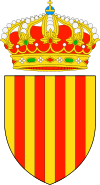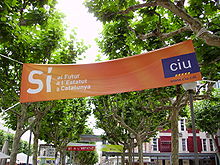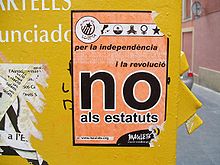- Draft of New Statute of Autonomy for Catalonia of 2005
-
Catalonia 
This article is part of the series:
Politics and government of
CataloniaStatuteParliamentJudiciaryPublic orderElectionsDivisions
Other countries · Atlas
Politics portal
On September 30, 2005, the Catalan Parliament approved (with the support of 120 deputies to 15) a proposal for reform of the current Statute of Autonomy. The approved proposal was sent for review and discussion to the Cortes Generales (Spain's parliament) on November 2, 2005.
Contents
Debate
After receiving the proposal drafted by the Catalan regional parliament, on November 2, 2005 the Spanish Congress of Deputies approved the admission to formality of the Proposal for reform of the new Statute of Autonomy of Catalonia with the support of all the groups except the People's Party (PP). The latter filed an objection of unconstitutionality before the Constitutional Court of Spain, currently in process. Its constitutionality has also been contested by some intellectuals and journalists related to liberal or conservative media such as the COPE (Catholic radio network) and the Madrid-based newspapers El Mundo and La Razón.
Pre-agreement
On January 21, 2006, Spanish Prime Minister José Luis Rodríguez Zapatero and Catalonian Leader of the Opposition Artur Mas arrived at a pre-agreement about nation definition and financing in the current project of statute.
Final reading
On May 10, 2006, the amended text [1] passed through its final reading through both Houses of the Parliament, with the support of all parties except both the Spanish main opposition party, the conservative People's Party, and the Catalan separatist party Esquerra Republicana de Catalunya. The latter voted against the project in the Spanish Congress of Deputies but abstained in the Senate (to avoid a blocking vote). ERC voted against it—despite its senior members having had a hand in drafting its content—as a result of the internal tensions within the party which this issue had brought to the surface. Later on both parties, for opposite reasons, supported a no vote in the referendum held afterwards regarding the passing of the new Statute.
Vote
The president of Catalonia, M. Hon. Pasqual Maragall, decided that Sunday June 18 would be the date on which the text would be put to the Catalan people in the form of a referendum. The referendum approved the Statute, the "yes" side receiving 74% of votes cast. Voter turnout was 49.41% of the total electorate, an unprecedentedly low figure for this type of vote. The new Statute has been in force since August 9, 2006
See also
Catalan constitutional referendum, 2006
Statute of Autonomy of Catalonia
External links
- Text of the 2005 Proposal for reform of the new Statute of Autonomy of Catalonia (in PDF)
Categories:
Wikimedia Foundation. 2010.
Look at other dictionaries:
Nationalisms and regionalisms of Spain — Early 19th century map showing the different regions of traditional consuetudinary law in Spain (fueros) based on the historical kingdoms … Wikipedia
Spain — /spayn/, n. a kingdom in SW Europe. Including the Balearic and Canary islands, 39,244,195; 194,988 sq. mi. (505,019 sq. km). Cap.: Madrid. Spanish, España. * * * Spain Introduction Spain Background: Spain s powerful world empire of the 16th and… … Universalium
Legal recognition of sign languages — The legal recognition of sign languages is one of the major concerns of the international Deaf community. There is no standard way in which such a recognition can be formally or legally extended; every country has its own interpretation. In some… … Wikipedia
Blaverism — (Valencian: blaverisme . Spanish: blaverismo ) is a political movement in the Valencian Community, Spain. It is characterised by its opposition to Catalan nationalism, seen as an imperialist movement that tries to impose the Catalan language and… … Wikipedia
France — /frans, frahns/; Fr. /frddahonns/, n. 1. Anatole /ann nann tawl /, (Jacques Anatole Thibault), 1844 1924, French novelist and essayist: Nobel prize 1921. 2. a republic in W Europe. 58,470,421; 212,736 sq. mi. (550,985 sq. km). Cap.: Paris. 3.… … Universalium
Germany — /jerr meuh nee/, n. a republic in central Europe: after World War II divided into four zones, British, French, U.S., and Soviet, and in 1949 into East Germany and West Germany; East and West Germany were reunited in 1990. 84,068,216; 137,852 sq.… … Universalium
education — /ej oo kay sheuhn/, n. 1. the act or process of imparting or acquiring general knowledge, developing the powers of reasoning and judgment, and generally of preparing oneself or others intellectually for mature life. 2. the act or process of… … Universalium
Europe, history of — Introduction history of European peoples and cultures from prehistoric times to the present. Europe is a more ambiguous term than most geographic expressions. Its etymology is doubtful, as is the physical extent of the area it designates.… … Universalium
Nationalities and regions of Spain — Nationalities[1][2] (Spanish: Nacionalidades) or historical nationalities[2][3] (Spanish: Nacionalidades históricas, Basque: Nazionalitate historikoak … Wikipedia
Puerto Rico — This article is about the Commonwealth of Puerto Rico. For other uses, see Puerto Rico (disambiguation). Commonwealth of Puerto Rico Estado Libre Asociado de Puerto Rico … Wikipedia


